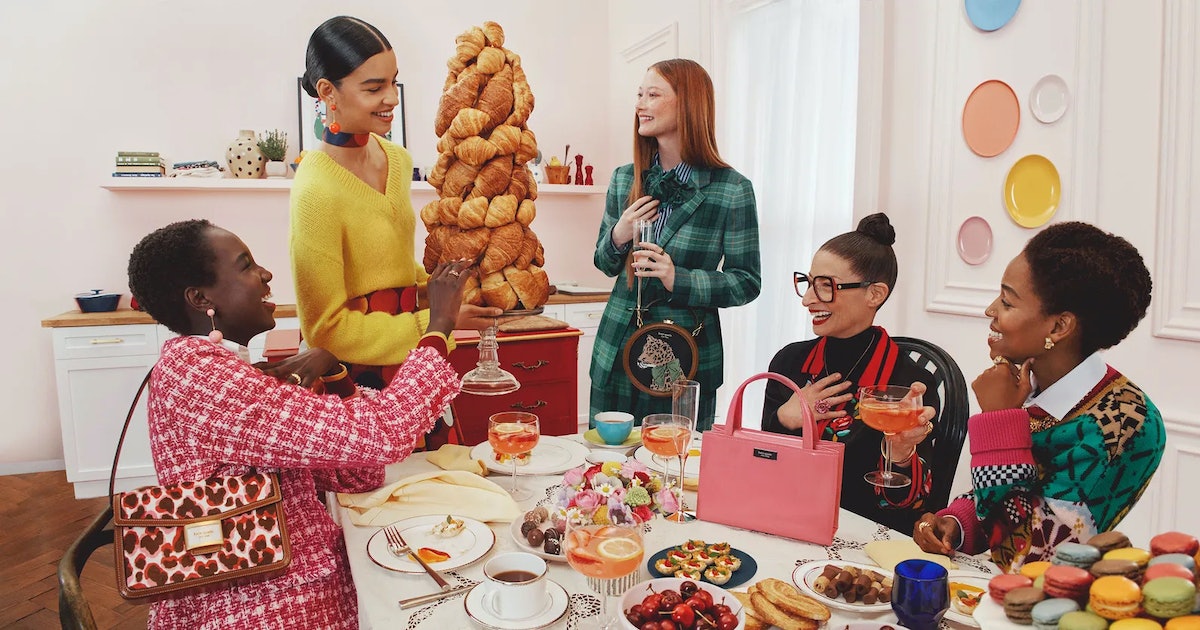What Happened: American fashion house Kate Spade has announced the opening of an interactive virtual pop-up store, and is inviting its customers to immerse themselves in the experience. The retail space, designed to be an exact replica of the brand’s New York townhouse building, is an extension of the label’s Autumn 2022 campaign, complete with gamified perks and exclusive products.
Users will be able to access the online project via Spade’s website from September 7, where they can dive into a digitally-rendered apartment building and explore multiple interactive activities — players can create their own custom wallpapers out of signature Kate Spade designs, contribute to the line’s “kindness wall,” and play music on virtual records. Within the game, customers will also have the opportunity to purchase one of three exclusive handbags that are, as of now, unavailable anywhere else but in the digital world: the Patisserie 3D croissant clutch, Sam Icon mini tote, and the Dottie small bucket bag.
The Jing Take: This marks Kate Spade’s first-ever project in the metaverse. But as more companies across the globe begin to ramp up their Web3 activations, an inaugural quickfire NFT drop is no longer effective at getting people talking — something Spade has seemingly grasped. Enter the era of gamification. Recognizing the surging interest among consumers in interactive activities that bridge the virtual with IRL, Spade’s latest concept not only taps a growing trend, but also incentivizes it by offering exclusive goods throughout the process.
Pairing in-game benefits with a unique approach to brand storytelling sounds appealing. However, the task of encouraging audiences to engage with the project in the first place poses its own challenges. The firm has done little to market the forthcoming experience via its social media platforms as of yet; with the business having no pre-existing presence in the digital realm, cultivating an active follower base that is willing to participate in the concept in time for its release may be tricky.
The virtual townhouse is a digital counterpart of the brand’s New York pop-up building which opened in April. Photo: Kate Spade
Though the townhouse represents a first for Kate Spade, the idea itself isn’t new. Retail pop-ups have recently begun to make waves across the digital landscape. From Zero10’s inter-dimensional store powered by AR technology to Tommy Hilfiger’s virtual outlet in Decentraland, Web3’s takeover is ushering in a new era of online — and indeed offline — shopping spaces.
While Spade’s project may only be a trial run, it symbolizes something bigger on the fashion industry’s horizon. The way we shop is changing, and it’s all thanks to the metaverse.
The Jing Take reports on a piece of the leading news and presents our editorial team’s analysis of the key implications for the luxury industry. In the recurring column, we analyze everything from product drops and mergers to heated debate sprouting on Chinese social media.
NFT, Retail
american retail, gamification, kate spade, metaverse, NFT, phygital, Tommy Hilfiger, virtual retail, virtual shopping, virtual store, Web3, zero10
© 2022 Herlar, LLC. All rights reserved. Jing Daily® is a registered U.S. trademark of Herlar, LLC.
Sign up for our daily newsletter to unpack the business of luxury in China. Gain insights, analysis, and breaking news from our on-the-ground reporters.
Necessary cookies are absolutely essential for the website to function properly. This category only includes cookies that ensures basic functionalities and security features of the website. These cookies do not store any personal information.
Any cookies that may not be particularly necessary for the website to function and is used specifically to collect user personal data via analytics, ads, other embedded contents are termed as non-necessary cookies. It is mandatory to procure user consent prior to running these cookies on your website.

